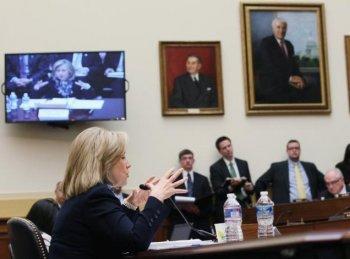WASHINGTON–Secretary of State Hillary Clinton has seized on the crucial role of US diplomacy in the Middle East amid recent uprisings to bolster the importance of the State Department’s $55.7 billion budget request.
Secretary Clinton gave testimony to the House Committee on Foreign Affairs on Tuesday, just hours after returning from Geneva and the United Nations Human Rights Council (UNHRC), which dealt with Libya.
Libya was strongly condemned by the UNHRC for cracking down on its people: sanctions were imposed on Gadhafi and his family, and a referral was made to the International Criminal Court.
Secretary Clinton said she pledged two expert humanitarian teams from USAID to help assist refugees who are fleeing the violence in Libya to neighboring countries of Tunisia and Egypt.
Clinton also said that peaceful transitions in Egypt occurred because the military, which had been trained by the US for years, was not willing to fire on its people.
When the crucial time came, diplomats were able to say: “Hey guys, do you remember us, we trained you, we worked with you and here is how you can do this,” she explained.
The Department of State (DOS) has divided its budget request into two parts, a core fund of $47 billion, which is basically flat from 2010 levels, and a contingency fund of $8.7 billion, similar to how the Department of Defense arranges their requests.
The Overseas Contingency Operations account includes continued funding for the civilian surge in Afghanistan as combat troops draw down.
“These missions are vital to our national security, and now would be the wrong time to pull back,” said Secretary Clinton.
Cuts of up to 15 percent were made to economic assistance to Central and Eastern Europe, the Caucasus and Central Asia. Development assistance to over 20 countries was cut by more than half.
House Republican are proposing a 16 percent spending cut from 2010 levels to DOS and USAID, which Secretary Clinton has warned “would be devastating to our national security.”
The US Department of State provides civilian support to the military in its main theaters of war in Afghanistan, Pakistan and Iraq. The DOS coordinates far-ranging diplomatic missions, consular services, aid programs, health and human services work, and trade promotion that touch every country in the world, except North Korea.
Secretary Clinton said she would like Congress to treat the DOS budget with the same level of importance as the military budget, which tends to win bi-partisan support because it is considered essential for national security.
Secretary Clinton expressed particular and repeated concern during the hearing about a decline in American presence overseas, warning repeatedly that the nation is facing stiff competition from China, Iran, and Russia, which are all zealously exerting themselves in traditional US stronghold regions.
She pointed out that despite drastic austerity cuts, the UK has also increased its international development budget.
Clinton recalled that as a young girl she was inspired when, during the cold war, the US was sending out messages “every hour of every day about what the alternatives were.” Since then, US communication overseas has steadily declined, she said.
“Every time we have scaled back [in the past] we have played a bigger price, and that is what I am worried about,” she said.
DOS has recently expanded its efforts to use social media, setting up a unit within the state department to that effect, and launching new Twitter feeds in a number of languages, including Farsi and Arabic.
On Feb. 23, Clinton participated in an online dialogue with Egyptian youth hosted by Masrawy.com, an Egyptian social media website. Over 6,500 questions were submitted over a two-day period prior to the meeting.
“We’ve got to be on the ground, and we need diplomacy and development to be viewed as national security, so that when these young people on the street say, well how do we write a constitution, it is the United States and our allies who are there to help, not the Iranians,” said Secretary Clinton.
“Everywhere I travel, I see people looking to us for leadership. This is a source of great strength, a point of pride and an unbelievable opportunity for the American people. But it is an achievement, not a birthright. It requires resolve—and it requires resources,” she added.
Secretary Clinton gave testimony to the House Committee on Foreign Affairs on Tuesday, just hours after returning from Geneva and the United Nations Human Rights Council (UNHRC), which dealt with Libya.
Libya was strongly condemned by the UNHRC for cracking down on its people: sanctions were imposed on Gadhafi and his family, and a referral was made to the International Criminal Court.
Secretary Clinton said she pledged two expert humanitarian teams from USAID to help assist refugees who are fleeing the violence in Libya to neighboring countries of Tunisia and Egypt.
Clinton also said that peaceful transitions in Egypt occurred because the military, which had been trained by the US for years, was not willing to fire on its people.
When the crucial time came, diplomats were able to say: “Hey guys, do you remember us, we trained you, we worked with you and here is how you can do this,” she explained.
DOS 2012 Budget Request
The Department of State (DOS) has divided its budget request into two parts, a core fund of $47 billion, which is basically flat from 2010 levels, and a contingency fund of $8.7 billion, similar to how the Department of Defense arranges their requests.
The Overseas Contingency Operations account includes continued funding for the civilian surge in Afghanistan as combat troops draw down.
“These missions are vital to our national security, and now would be the wrong time to pull back,” said Secretary Clinton.
Cuts of up to 15 percent were made to economic assistance to Central and Eastern Europe, the Caucasus and Central Asia. Development assistance to over 20 countries was cut by more than half.
House Republican are proposing a 16 percent spending cut from 2010 levels to DOS and USAID, which Secretary Clinton has warned “would be devastating to our national security.”
The US Department of State provides civilian support to the military in its main theaters of war in Afghanistan, Pakistan and Iraq. The DOS coordinates far-ranging diplomatic missions, consular services, aid programs, health and human services work, and trade promotion that touch every country in the world, except North Korea.
Secretary Clinton said she would like Congress to treat the DOS budget with the same level of importance as the military budget, which tends to win bi-partisan support because it is considered essential for national security.
Getting the American Message Out There
Secretary Clinton expressed particular and repeated concern during the hearing about a decline in American presence overseas, warning repeatedly that the nation is facing stiff competition from China, Iran, and Russia, which are all zealously exerting themselves in traditional US stronghold regions.
She pointed out that despite drastic austerity cuts, the UK has also increased its international development budget.
Clinton recalled that as a young girl she was inspired when, during the cold war, the US was sending out messages “every hour of every day about what the alternatives were.” Since then, US communication overseas has steadily declined, she said.
“Every time we have scaled back [in the past] we have played a bigger price, and that is what I am worried about,” she said.
DOS has recently expanded its efforts to use social media, setting up a unit within the state department to that effect, and launching new Twitter feeds in a number of languages, including Farsi and Arabic.
On Feb. 23, Clinton participated in an online dialogue with Egyptian youth hosted by Masrawy.com, an Egyptian social media website. Over 6,500 questions were submitted over a two-day period prior to the meeting.
“We’ve got to be on the ground, and we need diplomacy and development to be viewed as national security, so that when these young people on the street say, well how do we write a constitution, it is the United States and our allies who are there to help, not the Iranians,” said Secretary Clinton.
“Everywhere I travel, I see people looking to us for leadership. This is a source of great strength, a point of pride and an unbelievable opportunity for the American people. But it is an achievement, not a birthright. It requires resolve—and it requires resources,” she added.







